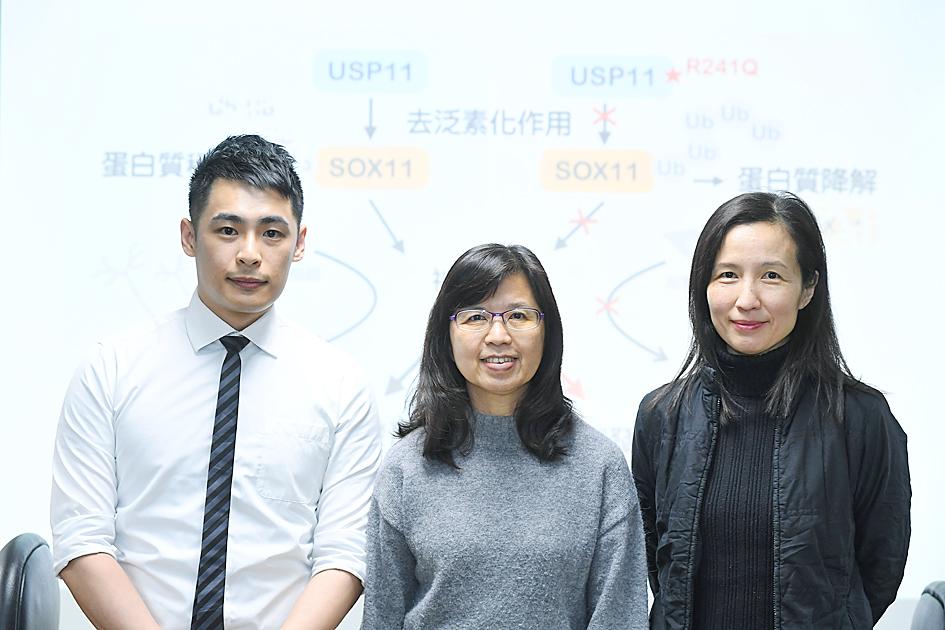A study headed by Academia Sinica researchers found that the instability of certain proteins might cause abnormal brain development, which was previously believed to be caused by genetic mutations.
Thus far, studies on cerebral development mainly focused on the transcriptional regulation of neurogenesis, underestimating the role of protein modification, Chen Ruey-hwa (陳瑞華), a research fellow at Academia Sinica’s Institute of Biological Chemistry, told a news conference in Taipei.
The stability of proteins is key to various bodily functions, she said.

Photo courtesy of Academia Sinica
The team, headed by Chen and Chou Shen-ju (周申如), an associate research fellow at Academica Sinica’s Institute of Cellular and Organismic Biology, found that a deubiquitinating enzyme called USP11 is related to cerebral malformation.
USP11 gene variants were previously discovered in people with inherited neurologic disorders, Chen added.
By deubiquitination, USP11 inhibits the modification of the SOX11 gene and stabilizes its expressions to facilitate neuron formation and the migration of newly synthesized neurons to their correct positions in the brain, contributing to building the brain’s neuron circuit, she said.
Ubiquitination refers to a cellular process that regulates proteins, including removing excessive or damaged proteins, and it can also repair damaged DNA, she added.
Through experiments on mice, the researcher found that USP11-deficient animals’ brains had a high number of unstable proteins, leading to the malformation of cortical development, he said.
When the USP11-deficient mice grew up, they exhibited behavioral abnormalities in, for example, learning, memory, and social and emotional expressions, she said.
The cerebral cortex is responsible for sensory and emotional processing, and higher cognitive functions, Chen said.
Its development is a dynamic and precisely orchestrated process, while any disruption during the process might lead to neurological disorders, such as intellectual disability, epilepsy or autism, she said.
People with neurological disorders often require long-term care and special education, causing considerable burden on their family and society, she said.
The study sheds light on the diagnosis and treatment of neurologic disorders related to abnormal cortical development, Chen said, adding that she hopes it would help develop methods to monitor brain development in infants.
The study, titled “Usp11 controls cortical neurogenesis and neuronal migration through SOX11 stabilization,” was published in the journal Science Advances on Friday last week.
It was partly funded by the Ministry of Science and Technology, the researchers said.

POSITIVE DEVELOPMENT: Japan and the US are expected to hold in-depth discussions on Taiwan-related issues during the meeting next month, Japanese sources said The holding of a Japan-US leaders’ meeting ahead of US President Donald Trump’s visit to China is positive news for Taiwan, former Japan-Taiwan Exchange Association representative Hiroyasu Izumi said yesterday. After the Liberal Democratic Party’s landslide victory in Japan’s House of Representatives election, Japanese Prime Minister Sanae Takaichi is scheduled to visit the US next month, where she is to meet with Trump ahead of the US president’s planned visit to China from March 31 to April 2 for a meeting with Chinese President Xi Jinping (習近平). Japan and the US are expected to hold in-depth discussions on Taiwan-related issues during the

‘LIKE-MINDED PARTNER’: Tako van Popta said it would be inappropriate to delay signing the deal with Taiwan because of China, adding he would promote the issue Canadian senators have stressed Taiwan’s importance for international trade and expressed enthusiasm for ensuring the Taiwan-Canada trade cooperation framework agreement is implemented this year. Representative to Canada Harry Tseng (曾厚仁) in an interview with the Central News Agency (CNA) said he was increasingly uneasy about Ottawa’s delays in signing the agreement, especially as Ottawa has warmed toward Beijing. There are “no negotiations left. Not only [is it] initialed, we have three versions of the text ready: English, French and Mandarin,” Tseng said. “That tells you how close we are to the final signature.” Tseng said that he hoped Canadian Prime Minister Mark Carney

Taiwan has received more than US$70 million in royalties as of the end of last year from developing the F-16V jet as countries worldwide purchase or upgrade to this popular model, government and military officials said on Saturday. Taiwan funded the development of the F-16V jet and ended up the sole investor as other countries withdrew from the program. Now the F-16V is increasingly popular and countries must pay Taiwan a percentage in royalties when they purchase new F-16V aircraft or upgrade older F-16 models. The next five years are expected to be the peak for these royalties, with Taiwan potentially earning

President William Lai (賴清德) yesterday bestowed one of Taiwan’s highest honors on Saint Vincent and the Grenadines (SVG) Ambassador Andrea Clare Bowman in recognition of her contributions to bilateral ties. “By conferring the Order of Brilliant Star with Grand Cordon on Ambassador Bowman today, I want to sincerely thank her, on behalf of the Taiwanese people, for her outstanding contribution to deepening diplomatic ties between Taiwan and SVG,” Lai said at a ceremony held at the Presidential Office in Taipei. He noted that Bowman became SVG’s first ambassador to Taiwan in 2019 and